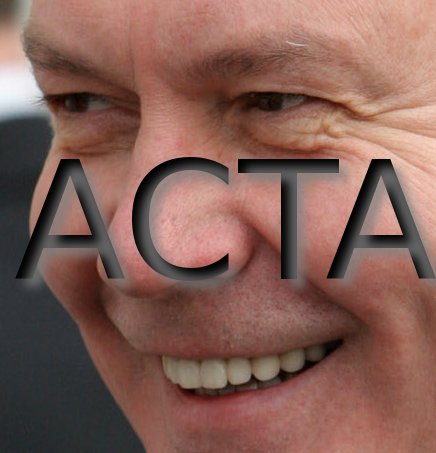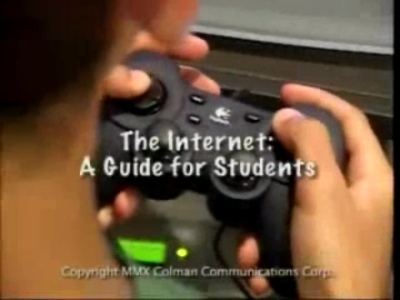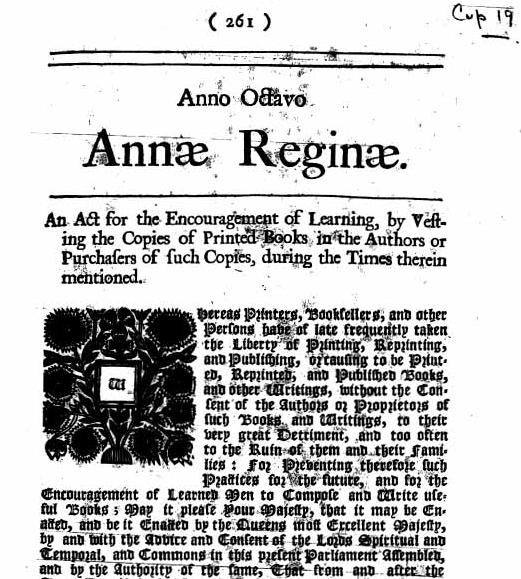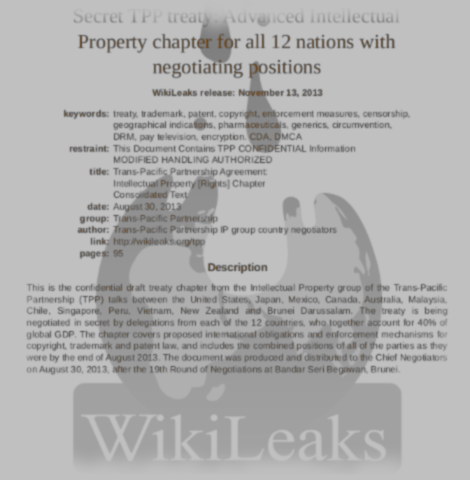12.18.13
Posted in Intellectual Monopoly at 12:22 pm by Dr. Roy Schestowitz
Not a terrorist

Summary: Police and secret agencies resort to actions which demonstrate that corporate profits — not safety of citizens — is their real priority
WE HAVE seen it all before. Jailing a whole class of people (imprisoned by the millions for free-as-in-no-cost labour and private gain [1]) is wise not just as a warning sign to all and a tool of imposing conformity; it also helps justify hiring a lot of policemen (domestic army for the upper class) and conducting limitless surveillance on almost everyone. An atmosphere of fear and distrust divides and thus weakens popular uprise. Whether the excuse is drugs or disruptive protests, or even — GASP — sharing of files, the corporate media always plays along with the Establishment, demonising whatever the class stereotype du jour happens to be (e.g. the type of drug (alcohol good, pot bad), the type of political opinions (war good, equality for all races bad)).
“It often seems like printers and wires are the new rifles and bullets now that the governments of the West virtually equate sharing with “privacy” and copyright violation with terrorism (in terms of severity of punishment).”In the West, law enforcement now lacks consistency; justice is in a state of disarray. To give some new examples from this month’s news, no courts are needed anymore to establish guilt regarding copyrights [2,3,4] and the founder of the Swedish Pirate Party, Rick Falkvinge, thinks that censorship without due process [5] is a symptom of dying business models [6]. In his country, Sweden, the authorities are not going after violent “Nazi” attacks (with stabbings) [7] and instead focus on some people who run Web sites. These authorities show that they don’t care about the law (and Julian Assange should know) as they resort to illegal confinement of citizens [8-10]. Even special forces from allies in the West get involved [11] while showing that they are hypocrites [12]. In the East, specifically in New Zealand, “Customs [Got] Asked to Leak Kim Dotcom Secrets to FBI” [13], essentially treating Megaupload like it was some kind of terrorist Web site [14], never mind if many site users were legitimate, law-abiding businesses [15]. Watch what has just happened to Hotfile [16] (Hotfile is in a similar business) and over in Sweden everyone should pay attention to news that a “Torrent Site Uploader [Was] Ordered to Pay $652,000 For Sharing One Movie” [17,18]. The authorities are going after people who download, not just upload [19], so the war on sharing clearly got worse, throwing in the same net almost everyone who surfs the Web (browsers are tools of text and binary downloads, plus rendering). When everyone is at the verge of going to jail or going bankrupt (surveillance contributes to this), a reign of terror solidifies control by the ruling minority (exempted from these abuses).
Copyright law has become a misused mess [20,21] and some people in high positions in the UK acknowledge this [22,23]. There are better ways to arrange attribution [24] and existing copyright law is not just about attribution, it is also about physical use of devices [25]. It often seems like printers and wires are the new rifles and bullets now that the governments of the West virtually equate sharing with “privacy” and copyright violation with terrorism (in terms of severity of punishment). █
Related/contextual items from the news:
-
The United States has about five percent of the world’s population and houses around 25 percent of its prisoners. In large part, that’s the result of the “war on drugs” and long mandatory minimum sentences, but it also reflects America’s tendency to criminalize acts that other countries view as civil violations.
-
-
As part of their ongoing effort to disrupt the activities of sites said to offering unauthorized access to copyrighted content, this morning UK police claimed successes on two key fronts. Operation Creative, the initiative backed by the Federation Against Copyright Theft and the BPI, is said to have secured the suspension of 40 ‘pirate’ domains in addition to a reduction in major brands advertising on the sites.
-
Measures proposed by Italy’s independent Electronic Communications Authority to tackle ‘pirate’ sites and their owners have passed with unanimous approval. The new system, which mandates the speedy removal of copyrighted content by hosts and the blocking of file-sharing sites by ISPs, will come into force on March 31 2014. Uploaders of infringing content and service providers who fail to take action face penalties of up to 250,000 euros.
-
Yet once more, The Pirate Bay has switched domain names, this time to Peru. In its promise to make DNS restrictions obsolete, The Pirate Bay creates a greater promise against all censorship.
-
-
-
ONE OF THE FOUNDERS of The Pirate Bay website is being held by Denmark under harsh conditions in solitary confinement without a warrant, and has no access to comforts like books to read or telephone privileges.
-
Since his arrival in Denmark to face hacking charges Gottfrid Svartholm has sat in solitary confinement, denied free access to mail and denied access to his books. The situation has outraged Wikileaks’ Julian Assange who says Gottfrid is now a political prisoner. Meanwhile Gottfrid’s mother Kristina has written to Amnesty hoping that they will take notice of her son’s plight.
-
WikiLeaks founder Julian Assange has slammed Sweden over Gottfrid Svartholm’s case. Since his transfer to a Danish prison, the Pirate Bay founder has been kept in solitary confinement and denied access to mail and reading material.
-
In Germany legal threats against file-sharers have been put on the radar of the U.S. Military. In a letter of advice prepared by the Army Judge Advocate General’s Corps, soldiers and civilians stationed in Germany are warned about the consequences of unauthorized file-sharing. The corps advises those who are affected not to ignore the threat but to seek further legal assistance.
-
For years the U.S. military operated pirated copies of logistics software that was used to protect soldiers and shipments in critical missions. Apptricity, the makers of the software, accused the military of willful copyright infringement and sued the Government for nearly a quarter of a billion dollars in unpaid licenses. In a settlement just announced, the Obama administration has agreed to pay $50 million to settle the dispute.
-
The ongoing case against Kim Dotcom and Megaupload continues to reveal unusual levels of surveillance. This week an email released after a freedom of information request reveals that a customs official offered “brownie points” for leaking sensitive information about Kim Dotcom to the FBI. The scandal follows on from last week’s news that Dotcom is still being spied on.
-
-
To address the rights of victimized copyright holders, the U.S. Government has recently obtained a secret court order. The sealed order allows it to share Megaupload evidence with industry trade groups who may want to take legal action. At the same time, however, the Government refuses to assist former Megaupload users. In a letter to the court the Electronic Frontier foundation is now pointing out that these users are victims too.
-
A few hours after news broke that Hotfile had signed a $80 million settlement agreement with the MPAA, the file-hosting service has completely shut down. The drastic decision to deny access to millions of files without warning will come as a shock to the countless individuals who used Hotfile to store their personal and business documents. Hotfile has yet to comment on the controversial move which does nothing to help the image of cloud hosting providers.
-
A moderator and uploader of one of Sweden’s oldest but now defunct private torrent sites has been hit with a huge damages award. For uploading a single pre-release movie the 28-year-old is now required to pay $652,000, the equivalent amount the studio would have charged for a license to distribute the movie for free. For sharing more than 500 others he received a suspended jail sentence plus 160 hours community service.
-
A Swedish man has been sentenced to the highest damages ever in Sweden, and possibly in the entire world, for sharing culture: 4.3 million SEK (€475,000) for sharing ONE movie. The movie Beck – Buried Alive, a typical Swedish taxpayer-subsidized B-movie, was uploaded to the culture-sharing hub Swebits. This represents a heavy escalation in the war over sharing knowledge and culture.
-
-
We’ve had a few posts about plagiarism here on Techdirt, and how it differs from copyright infringement. One important question that needs to be considered is: what’s the correct way to acknowledge and correct plagiarism when it is discovered? Probably not like this…
-
The Princess Bride remains quite the iconic book and movie for tons of people who grew up in the 1970s and 1980s (and, hopefully, other ages as well… but I can only speak from experience). A huge number of lines have lived on from that movie and become mainstays in popular culture. And like all sorts of great culture, it has inspired plenty of additional creativity around the original as well.
-
-
We received a reply from Lord Younger today, who is the minister responsible for copyright reform. He says that the government plans to legislate for all the copyright changes in the New Year, including parody.
-
-
A case that went before the Supreme Court yesterday has a very long history. Lexmark sued Static Control Components (SCC) in 2002, arguing that SCC shouldn’t be allowed to reverse-engineer its printers to help others create replacement toner cartridges, because of copyright law. In 2004, an appeals court ruled in favor of SCC, and that ruling has become a cornerstone of DMCA-era copyright law.
Permalink
 Send this to a friend
Send this to a friend
12.12.13
Posted in Debian, Intellectual Monopoly, Ubuntu at 12:42 pm by Dr. Roy Schestowitz
On the shoulders of giants but without shoulders of one’s own
Summary: How Canonical impedes dissemination of work that Ubuntu inherits from other projects, such as Debian and GNU
Linux Mint KDE [1] and Linux Mint Xfce [2] are two examples of Linux Mint releases that widely deviate from Ubuntu, unlike the GNOME (and derivatives like Mate and Cinnamon [3]) version of Linux Mint 16. When there were gentle arguments about security of Linux Mint Clement Lefebvre made it known that Canonical wanted Mint to license Ubuntu binary packages. This angle is being explored again [4] because products like MintBox [5] rely on Canonical giving access to those binaries (otherwise they become less secure). Jim Lynch’s studying of this relies on a bit from DistroWatch that says: “Clem claims he has been asked by Canonical’s legal department to license the binary packages used by Ubuntu. To me this is a scary thought. Ubuntu is a base distribution for many projects, some of them (such as Mint and Kubuntu) are quite successful.
 “Clem’s statement makes me wonder if Canonical has approached other open source projects about licensing the right to access Ubuntu’s package repositories. If so, what might follow? Would derivative distributions need to pay to use Canonical’s packages? How would Canonical enforce such a policy, with lawyers, by blocking access to the repositories if a user isn’t using Genuine Ubuntu?”
“Clem’s statement makes me wonder if Canonical has approached other open source projects about licensing the right to access Ubuntu’s package repositories. If so, what might follow? Would derivative distributions need to pay to use Canonical’s packages? How would Canonical enforce such a policy, with lawyers, by blocking access to the repositories if a user isn’t using Genuine Ubuntu?”
Should Canonical start signing licences to use Debian packages too? It looks like trademarks are no longer the only type of Intellectual Monopolies we should debate.
Canonical is growing increasingly selfish and isolated, with hardware deals around something called “Ubuntu Touch OS” [6,7,8] (hardly GNU/Linux) and work around Canonical copyrights [9] (Unity). No wonder some people see the “ugly” side [10]. In his latest talks across the UK Richard Stallman was discouraging adoption of Ubuntu by members of the audience. █
Related/contextual items from the news:
-
Clement Lefebvre has announced earlier today, December 8, that the Release Candidate (RC) version of the upcoming Linux Mint 16 KDE Edition operating system is available for download and testing.
-
-
-
The MintBox 2 is here, and it’s more powerful than ever. Just how much power are you getting for nearly £400 though?
-
The recently released Mint 16, nicknamed Petra, might be the perfect Linux desktop for newcomers.
At its core is Ubuntu 13.10, but on top of this are desktops Mate and Cinnamon, the latter being the Mint project’s homegrown user interface.
-
Canonical has inked its first deal with partner who’ll put the Linux-basd operating system on its phones, founder Mark Shuttleworth reveals.
-
-
-
-
Permalink
 Send this to a friend
Send this to a friend
12.06.13
Posted in Intellectual Monopoly at 12:09 pm by Dr. Roy Schestowitz

Summary: The Church which claims to have 1.2 billion members is expressing dissatisfaction and opposition to TPP and TAFTA/TTIP
GLYN Moody has been keeping an eye on TPP for quite some time (we too covered it). Yesterday he noted that even the Holy See (the Pope) is now weighing in, antagonising TPP and the likes of it. It is common to find opposition to TPP from Australian [2] and European [3] people’s groups (ACTA booster Karel de Gucht is at it again), unlike from big business groups, so the involvement by the Roman Catholic Church is unusual. Since the Catholic Church cab mobilise many people, perhaps this — unlike activism from us geeks — can assure that people will be up in arms in the streets (like in the days of ACTA, just before it got defeated). █
Related/contextual items from the news:
-
The statement then goes on to criticize the move away from multilateral trade agreements of the kind traditionally drawn up at the WTO, to new-style “mega-regional trade agreements”, routinely negotiated in secret:
Currently there is a clear tendency to further enlarge these RTAs [Regional Trade Agreements] to form mega-regional trade agreements such as the Transatlantic Trade and Investment Partnership, or the Trans-Pacific Partnership. Certainly, the enlargement of regional trade agreements is a step towards further trade liberalization but we have to bear in mind that these agreements inevitably threaten the desirability to reach an agreement on a truly multilateral basis. In fact, by entering a regional trade agreement a country reduces the incentives to extend its efforts on trade liberalization at a multilateral level.
-
Australian consumer advocate, CHOICE, will be running a newspaper ad campaign slamming the secret TPP trade treaty that some say threatens to trade Australians’ rights away in favour of US corporate interests.
-
European Union Trade Commissioner Karel de Gucht today (27 November) defended the inclusion of an investor-state dispute settlement provision in the Transatlantic Trade and Investment Partnership (TTIP). De Gucht argued the out-of-court settlements allowing private sector to sue governments were necessary because the TTIP would not per se give EU companies a standing in US courts.
[...]
De Gucht assured the INTA Committee in today’s session that the Parliament would enjoy the same transparency as the Council of Ministers of the EU, yet the US was concerned about potential leaks of papers. Asked if there had been pressure to not share US negotiating positions with member states, de Gucht answered evasively.
Permalink
 Send this to a friend
Send this to a friend
12.05.13
Posted in Deception, Intellectual Monopoly, Microsoft at 10:33 am by Dr. Roy Schestowitz

Summary: Schools become a target of shameless copyright propaganda and promotion (advertising) of copyright boosters/maximalists
THE Open (as in libre) Access movement has brought great benefits to students, as this new article reminds us [1]. Now that we have sharing-friendly licences such as Creative Commons 4.0 [2] it is no surprise that extensive encyclopaedias like Wikipedia are available for download by all [3]. It maxmimises sharing of knowledge, much to the disdain of “Copyright And Patent Maximalists” [4] who promote criminal cartels (the “Copyright Monopoly” [5]). All sorts of proxies and fronts, including some British thing that’s deceivingly called “Culture Committee” [6] (back in Sept.), continue to promote the fiction of piracy and those who the “Culture Committee” claims to represent do not even agree [7]. Basically, a bunch of non-artists in suits are manipulating and misrepresenting society’s interests so that they can hoard money and tax everyone while limiting dissemination of culture.
One jaw-dropping gallery of propaganda at schools was assembled and explained by Will Hill the other day. Watch how the cartel is now working to indoctrinate everyone’s children under the obligatory system known as schools. As Hill put it: “Here is some of what public school students are being taught about computers, the internet copyright and sharing. These are screen captures from a film my twelve year old daughter was shown and quizzed on. Some of the message is useful but the overall tone is one of paranoia, distrust of your neighbors and obedience to authorities, such as publishers and government officials. Facebook, Microsoft and Google are promoted, with the lion’s share of promotion going to Facebook and Microsoft. There’s more than a hint of racism at one or two points.”
Watch the images and be disgusted. This is the cartel taking its propaganda into the classrooms. We need to fight back against this. Culture is at stake as some opportunists want to privatise it. █
Related/contextual items from the news:
-
The average cost for college textbooks for the 2013-2014 school year at OU is $848 per student, according to OU’s website. If you plan on obtaining a four/five-year education, those costs can really add up.
But what if some of your books were free to use and accessible to anyone with Internet access at any time? Doesn’t sound too bad, right? This initiative is called open-source textbooks, and colleges across the nation, including OU, are giving this alternative method of providing resources for students a glance. Not only are certain schools looking into this, the general book cost issue has gained national attention.
-
Creative Commons proudly introduces our 4.0 licenses, now available for adoption worldwide. The 4.0 licenses—more than two years in the making—are the most global, legally robust licenses produced by CC to date. Dozens of improvements have been incorporated that make sharing and reusing CC-licensed materials easier and more dependable than ever before.
-
-
Tim Lee, over at the Washington Post’s The Switch, has an excellent, detailed look at why the USTR seems to think that patent and copyright maximalism is in the best interests of America. There are two key reasons, which I’ll paraphrase as (1) the employees at USTR have strong connections to copyright and patent maximalists, and there’s a constant revolving door between USTR and IP maximalists, and (2) they’re basically ignorant of how the digital world works today.
-
The emergence of experimental legally autonomous startup zones in Honduras and other places is one of the most exciting developments in a long time, and forebodes the collapse of the copyright industry’s tyranny over culture and knowledge.
-
This morning the Culture, Media and Sport Committee published its report into how to support the creative industries. While it is a wide-ranging report, on copyright reform there is plenty to be disappointed about.
-
English comedian Russell Brand is no stranger to controversy and in the past few days the funnyman has been at it again, this time concerning the release of his new DVD. Brand informed his Twitter followers that obtaining Messiah Complex can be achieved in various ways, not least via The Pirate Bay. Potential UK viewers need not be concerned about ISP censorship either, as Brand helpfully provided a link to a Pirate Bay proxy.
Permalink
 Send this to a friend
Send this to a friend
11.30.13
Posted in Action, Intellectual Monopoly at 2:55 pm by Dr. Roy Schestowitz

Summary: The problem known as “piracy” is an antiquated problem from history, tales, and Somalia, not people who challenge the real thieves — those who hoard and monopolise what’s public
AN interesting new report says that propaganda words like “piracy,” “theft” and “stealing” (often used to imply guilt of serious crimes) are to be banned from a court in the context of copyrights [1]. Copyrights, after all, are about copying; the word isn’t pronounced ‘theftrights’. Might we finally see fact-based judgment as a result? Will judges not be tempted to get carried away and wrapped up in misconception spread in the corporate media by its monopolistic owners? Let’s hope so.
As the “Pirate Party” founder reminds us, the real thieves are those who take away from society at the expense of artists [2] (take, not copy), sometimes at the expense of the public sector or the public domain [3].
The so-called ‘IP’ cartel continues to be run by selfish sociopaths who think they are above the law (or simple are the law) and treat even their own employees like cattle [4. They would go as far as using terms like “Pirate Sites” [5] to describe sharing sites which businesses may use to transmit files and individuals may use to store their own (self-created) media. We need to stop the attack on sharing and one important step is abolishing the use of propaganda words. Judge Kathleen Williams is awesome. █
Related/contextual items from the news:
-
Leading up to the trial, Hotfile has scored several significant wins against the MPAA. The Florida federal court ruled on several motions this week, and many went in favor of the file-hosting service. Most prominently, Judge Kathleen Williams decided that the movie studios and its witnesses are not allowed to use “pejorative” terms including “piracy,” “theft” and “stealing” during the upcoming proceedings.
-
Copyright maximalists want all sorts of new laws to “help authors get paid”. Well, I’m a published author, and all their efforts to “help” cost me money. Even if we strictly limit the argument to printed books, copyright maximalists still only succeed in harming authors and publishers. This is how.
-
It’s as if they lifted the plot right out of a Cory Doctorow novel. In Maryland, the Prince George’s County Board of Education is considering a proposal that would allow the school system to copyright ownership of all work created by students and teachers. The sweeping intellectual property grab could mean that anything from a drawing to an app to a lesson plan would become the property of the school system, not the creator.
-
Francis Gurry, the head of the World Intellectual Property Organization, seems to be running from scandal to scandal these days. While it has shown brief moments of enlightenment, for the most part, WIPO tends to be an organization very supportive of the copyright and patent maximalist agenda. Last year, we wrote about two incredible scandals that directly involved Gurry.
-
While its common for search engines to receive DMCA takedown requests for specific URLs, events in France have taken things to a whole new level. In order to protect the copyrights of film producers, the High Court of Paris has concluded a 2011 case by ordering Google, Microsoft and Yahoo to completely de-list 16 video streaming sites from their search results.
Permalink
 Send this to a friend
Send this to a friend
11.17.13
Posted in Intellectual Monopoly at 10:51 am by Dr. Roy Schestowitz
Copyright law addresses needs from centuries ago

Summary: Laws which were written in the age of primitive printing machines cannot be applied to the age of mass exchange (Internet)
WHILE Hollywood is trying to make copyright law even more draconian (through TPP), here in Europe there is an effort to reform (weaken) copyright [1,2]. It is a struggle between politicians who work for Hollywood and politicians who work for the people, not just European people. Sometimes the former group is scoring wins; take for instance this US-style censorship of the Web at the behest of the copyright monopoly (mostly from the US) [3].
The copyright monopoly fought Google over the attempts to reform copyrights for the digital age and Google has just won [4,5,6]. Microsoft, as usual, fought all along together with the copyright monopoly (against Google), showing its huge hypocrisy because it tried to do what Google did and just never succeeded (the product/service got shut down). This whole case helped show what force we are up against and it helped show that with enough determination we can defeat the copyright monopoly. We just need more activism and we need to pressure our politicians to serve public interests, not publicly-traded companies. █
Related/contextual items from the news:
-
Time for copyright to be an enabler, not an obstacle.
-
Ahead of the last meeting of the “Licences for Europe” initiative, five European citizen organisations – Centrum Cyfrowe, EDRI, Kennisland, Modern Poland Foundation, and La Quadrature du Net – release the following joint press release reaffirming the urgent need of an European Copyright reform.
-
Legal action in Denmark has added several major movie download sites to the country’s blocklist. Anti-piracy group Rights Alliance, which acts on behalf of local and United States-based copyright holders, successfully applied to have four sites including Movie4K and PrimeWire blocked at the ISP level. With ten unlicensed domains now inaccessible in Denmark on copyright grounds, rightsholders in Norway are now speaking with ISPs about a Pirate Bay blockade.
-
Scans that show snippets are legal—they don’t replace the full book.
-
-
Google has won a resounding victory in its eight-year copyright battle with the Authors Guild over the search giant’s controversial decision to scan more than 20 million books from libraries and make them available on the internet.
Permalink
 Send this to a friend
Send this to a friend
Posted in Intellectual Monopoly at 10:34 am by Dr. Roy Schestowitz
Leaks can save many lives

Image by Moizsyed
Summary: Another good example of the need to protect and make possible anonymous leaks of material like TPP documents
THANKS in part to FOSS, which facilitates whistleblowing, TPP is out in the wild. There are so many articles about it (from many nations) and politicians respond to the leaks. It’s having a huge impact.
To give just a short summary, the Washington Post calls TPP a “Hollywood wish list” [2], FOSS sites praise Wikileaks [2], digital freedom sites say that TPP is “worse than ACTA” [3], the Canadian Web sites accuse the US of pressuring Canadian politicians [4], and there is plenty more from New Zealand [5] and Australia [6-10] (all in English). European sites which publish in English covered this as well [11]. The reports are self explanatory and they don’t necessitate further comments from us.
When people argue that leaks are a “Bad Thing”, be sure to cite TPP for refutation. █
Related/contextual items from the news:
-
Officially, the Trans-Pacific Partnership is a trade treaty that will ease the flow of goods and services among the United States, Canada, Chile, Japan, New Zealand, Malaysia, and other nations along the Pacific Rim. But it has attracted criticism for its secrecy, and for the inclusion of controversial provisions related to copyright, patent, and trademark protections.
-
Wikileaks has published a draft document of a chapter of the Trans-Pacific Partnership (TPP) agreement–the year’s most controversial secret treaty. The secretive multinational free-trade treaty is currently being negotiated by 11 Pacific Rim nations.
-
We’ve been waiting a long time for a major leak of the secretive TPP agreement, and thanks to Wikileaks, we now finally have it (pdf – embedded below). It’s long and heavy going, not least because of all the bracketed alternatives where the negotiators haven’t been able to agree on a text yet. Even though the draft is fairly recent — it’s dated 30 August, 2013 — it contains a huge number of such open issues. Fortunately, KEI has already put together a detailed but easy-to-understand analysis, which I urge you to read in full.
-
This morning WikiLeaks released secret documents that have confirmed an extreme Internet censorship plan is being pushed behind closed doors as part of the International Trans Pacific Partnership (TPP) agreement. Over 100,000 people from around the world have already spoken through an online campaign at http://openmedia.org/censorship
-
Secret details show NZ opposed US on issues such as copyright and medicines.
Secret details of the United States-Pacific trade agreement have been leaked showing New Zealand in serious dispute with US negotiators on many issues.
-
Part of the Trans-Pacific Partnership Agreement has finally been leaked – and the situation is grim. NM asked experts, including Underground author Suelette Dreyfus, what concerns them most
-
The United States is pushing for greater powers over patent and property rights, according to a WikiLeaks release of secret negotiations behind one of the world’s largest trade agreements.
-
Wikileaks has leaked a draft of the IP chapter of the Trans-Pacific Partnership (TPP) agreement, confirming the Australian government is backing a reinforcement of geoblocking and will also be opposing moves to make ISPs not responsible for what their users do.
-
Thousands of Australians could face new criminal penalties for illegally downloading content under the proposed Trans-Pacific Partnership (TPP) trade agreement.
-
The extraordinarily detailed information on negotiating positions released by WikiLeaks shows Australia repeatedly backing the interests of the US against the objections of countries including Canada, New Zealand, Japan, Singapore and Vietnam on questions involving intellectual property. Australia is often the only one of the 12 parties to the Trans Pacific Partnership negotiations to do so.
-
For years, the United States and partner governments have worked vigorously to keep the publics they represent from knowing what they are negotiating behind closed doors in the top-secret Trans-Pacific Partnership trade agreement. But today’s Wikileaks release of the draft intellectual property chapter blew that up, confirming the fears of public interest groups that this is an agreement heavily weighted toward big industry interests.
“If instituted, the TPP’s IP regime would trample over individual rights and free expression, as well as ride roughshod over the intellectual and creative commons,” WikiLeaks’ Editor-in-Chief Julian Assange said in a release. “If you read, write, publish, think, listen, dance, sing or invent; if you farm or consume food; if you’re ill now or might one day be ill, the TPP has you in its crosshairs.”
Permalink
 Send this to a friend
Send this to a friend
11.13.13
Posted in Intellectual Monopoly at 11:20 am by Dr. Roy Schestowitz
Thank you, Wikileaks

Summary: Learning what the Trans-Pacific Partnership (TPP) is about (basically a corporate land grab of global scale) is now possible
A FEW months ago, the victims of TPP (who are over 99% of the world’s population) got hold of the leaked file from TPP negotiations, Wikileaks-secret-TPP-treaty-IP-chapter.pdf. Like Cablegate before it, this leak shows serious corruption. It shows how corporations are capturing political systems all around the world in order to provide themselves with protectionism. Glyn Moody told me a few hours ago: “it would be great to get this out to your networks – http://keionline.org/node/1825 they don’t want people to know what’s in TPP…”
Here some shorter analysis from KEI for those who haven’t time to read the whole thing. For the uninitiated, here is a video where Noam Chomsky explains what TPP is about. We’ll continue to post links about TPP and urge readers to fight TPP like a plague. █
Permalink
 Send this to a friend
Send this to a friend
« Previous Page — « Previous entries « Previous Page · Next Page » Next entries » — Next Page »


 “Clem’s statement makes me wonder if Canonical has approached other open source projects about licensing the right to access Ubuntu’s package repositories. If so, what might follow? Would derivative distributions need to pay to use Canonical’s packages? How would Canonical enforce such a policy, with lawyers, by blocking access to the repositories if a user isn’t using Genuine Ubuntu?”
“Clem’s statement makes me wonder if Canonical has approached other open source projects about licensing the right to access Ubuntu’s package repositories. If so, what might follow? Would derivative distributions need to pay to use Canonical’s packages? How would Canonical enforce such a policy, with lawyers, by blocking access to the repositories if a user isn’t using Genuine Ubuntu?”





















 Content is available under CC-BY-SA
Content is available under CC-BY-SA